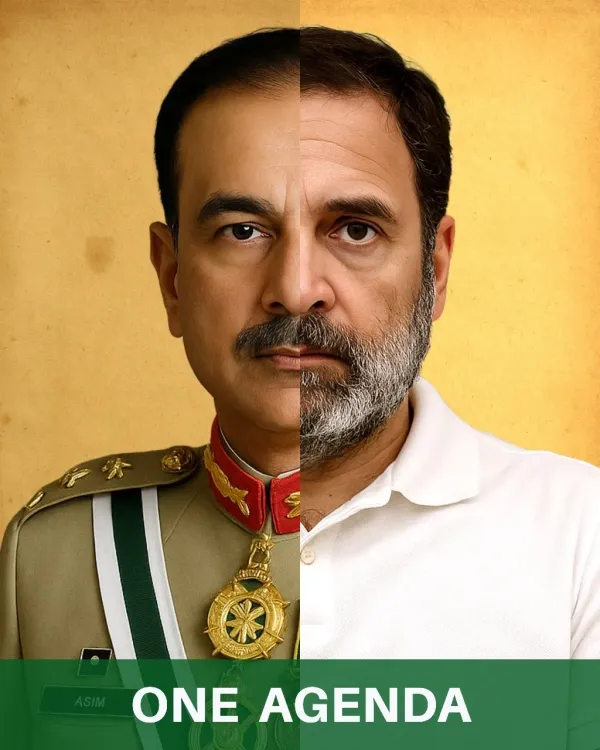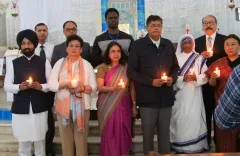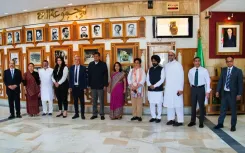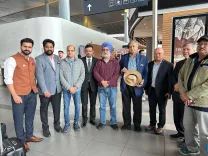Is There a Shared Agenda Between Rahul Gandhi and the Chief of Pakistan Army?

Synopsis
In a dramatic clash, Assam Minister Ashok Singhal accuses Rahul Gandhi of aligning with Pakistan's agenda following Gandhi's viral posts about Operation Sindoor. As tensions rise, the BJP condemns Gandhi's claims, sparking a heated debate on national security and accountability. Discover the implications of this controversy for Indian politics and international relations.
Key Takeaways
- Rahul Gandhi's posts on Operation Sindoor have sparked controversy.
- Assam Minister Ashok Singhal accuses Gandhi of sharing an agenda with Pakistan.
- The BJP has criticized Gandhi's claims, calling them a misrepresentation of facts.
- The controversy highlights the sensitive nature of India-Pakistan relations.
- Political leaders must communicate responsibly in matters of national security.
New Delhi, May 20 (NationPress) Following the viral spread of Congress leader Rahul Gandhi’s recent posts on social media regarding Operation Sindoor, BJP leaders have sharply criticized him.
Assam cabinet minister Ashok Singhal accused Gandhi of promoting an agenda that aligns with that of Pakistan.
In a striking social media update, the Assam Minister of Health, Family Welfare, and Irrigation noted that although Rahul Gandhi and Pakistan Army chief General Syed Asim Munir are separated by a border, they are united by a common agenda.
Singhal posted a contrasting image of Munir and Gandhi on his X handle, showing a clean-shaven Munir in military attire alongside a bearded Gandhi in a white T-shirt, captioned “One Agenda”.
This incident follows Gandhi’s posts requesting details about Operation Sindoor, which have gained significant attention in Pakistan.
Recently, Rahul Gandhi has targeted External Affairs Minister Dr. S. Jaishankar, alleging that the government “informed Pakistan at the outset” of Operation Sindoor, labeling this act not as a lapse, but as a crime.
On Saturday, Gandhi shared a video of EAM Jaishankar speaking to the press on his X handle, questioning, “Informing Pakistan at the start of our attack was a crime. EAM has publicly admitted that the GOI did it. Who authorized it? How many aircraft did our airforce lose as a result?”
On Monday, he reposted the video, stating that the External Affairs Minister's silence is not only revealing but also damning. “So I’ll ask again: How many Indian aircraft did we lose because Pakistan was aware? This was not a lapse; it was a crime. The nation deserves the truth.”
Shortly after Gandhi’s post, it gained traction in Pakistan, with their leaders referencing him while criticizing India’s assertions regarding Operation Sindoor. His statements have been extensively discussed across Pakistani television channels.
Despite clarifications from the Ministry of External Affairs regarding the EAM’s comments, Rahul Gandhi has remained steadfast in his position.
The MEA issued a statement clarifying that the External Affairs Minister stated they had warned Pakistan at the start, which refers to the initial phase after the commencement of Operation Sindoor. They condemned the misrepresentation of facts.
On Monday, Foreign Secretary Vikram Misri updated a parliamentary committee on the India-Pakistan military conflict following the Pahalgam terror attack, reaffirming the government’s stance that decisions to cease military actions were made bilaterally, countering claims by US President Donald Trump about his involvement in de-escalation.
The BJP has labeled Rahul Gandhi’s remarks as a gross misrepresentation of facts. They have suggested that the Leader of Opposition's misrepresentation reflects malicious intent and raised questions about the timing of his allegations.





